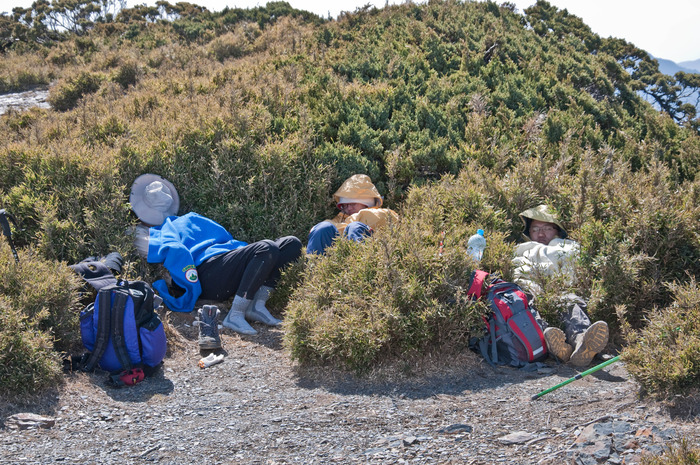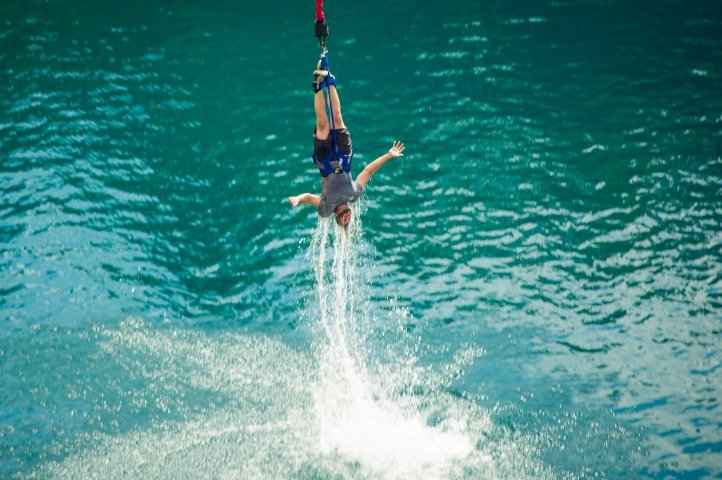
Imagine you’re on a hike. (Where I live, everyone loves to hike.) Imagine you’re out in the woods, and you’ve been on the trail for hours, going steadily uphill, stepping carefully over rocks and slippery wet roots. By the time you reach the summit, you’ve eaten all your snacks, drunk most of your water, and rolled your ankle once or twice. But you’re there! You’ve made it. And you’re enjoying the view when suddenly you notice, in the distance, another peak, just slightly higher than the one you’re on.
It turns out you haven’t reached the summit. That’s another mile along. Do you turn around anyway and, when you get home, post a picture on Instagram with the caption, “Made it to the false summit, got a decent view from there.” Or do you keep going?
Say you keep going. And say, when you reach that next peak—yep, you guessed it—another even higher peak appears in the distance, yet another mile along. At what point do you quit? At what point is it simply too dangerous to continue? (Remember the depleted snack supply!) As you weigh your decision, I wonder if, like me, you’ll discover that a little danger makes the present adventure more enticing. After all, the greater the challenge is, the greater the story will be when you make it out alive. “We had eaten all our snacks! But we continued on anyway!”

In a recent piece for Outside, Marc Peruzzi observed that with increasing frequency the motivations for many outdoors enthusiasts are being caught up in this pursuit of glory. And sometimes it doesn’t end so well.
Increasingly, what we do outside is less about enjoying the activity itself as an intrinsic good, and more about planning ways to go bigger, faster, and farther, often for our selfie-stick mounted cameras. And so it went that once healthy outdoor pursuits devolved into suicide clubs.
Don’t believe me? Check the numbers. From 2007 to 2013, the Centers for Disease Control reported that rates of TBI-related emergency room visits increased by 47 percent in six years—this, while cars were getting safer. Brain surgeons and mountain town ER docs I spoke with have all told me they believe much of this increase was from action sports. More recently, Flight for Life Colorado reported a 12 percent year-to-year rise in rescues, with much of the bump in flights, at least anecdotally, attributed to folks crashing mountain bikes, busting themselves up jumping off bridges, and generally getting in way over their heads. […]
You don’t have to be mountain climber or ‘an enduro racer’ to pick up what Peruzzi is putting down. Whatever we achieve, in any sphere of life, is rarely what satisfies us, at least in the long term. When we accomplish one thing, we’re often looking quickly to the next thing, immediately forgetting that, once, we dreamed about being exactly where we are. (Conversely, whatever we might achieve easily gains the appearance of worthlessness.)
This is what Peruzzi calls ‘the progression mindset.’ This is the mindset that says, “So you ran a half marathon…now you have to run the full,” or, “You’ve hiked ten miles…so, fifteen next week?” There’s always something better—and, implicitly, more dangerous—up ahead. And while I don’t see myself jumping out of a plane anytime soon, who doesn’t have the tendency to want to go “bigger, faster, and farther”?
In nearly all these tragedies, some element of the progression mindset played a role. Elite athletes and adventurers charging, pushing the limits of their skills, the snowpack, or the mountains, and suddenly running out of room for error. Since the 1980s, avalanche forecasters have known that the more avalanche knowledge a backcountry user acquires, the more they believe that they can “manage” the snowpack. The dynamic is known as negative event feedback—the more events you survive, the more invincible you think you are. But avalanches don’t work that way, which, beyond the exposure, is perhaps why avalanche forecasters die in avalanches at higher rates than citizen backcountry skiers. Counterintuitively, skill—progression—only increases risk.

Social media, in Peruzzi’s view, incentivizes dangerous outdoor activity— “Too many of us are beholden to social-media expectations, the subjective scoring of action sports, and a desire to push increasingly out-there limits…” So much anxiety arises from visions of who we could be, or what we could be doing. With or without social media, we often find ourselves captivated by the vivid dream of one day meeting (or defying) the expectations of those around us, by the flickering hope of one day being deemed ‘worthy,’ or by the promise of feeling like our lives are really, finally being lived. In his essay “The Concept of Experience (Part 1),” Mark Greif writes:
Even where life appears to be lived for happiness, it is lived by and through experience. We see our lives as a collection of experiences: “the day I met those people at that party”; “the night I lost my virginity”; “the feeling I had as a tourist in Paris” or “when I stood at the lake in the woods.” These snow globes and beach rocks can be held on to, compared, and appraised for quality. You put them on the shelf, and take them down; or lie awake at night, just wondering at them. They come with stories, and you put forward your experiences as rivals to the experiences others can tell. We become lifelong collectors, and count on fixed mementos to provide the substance of whatever other aims we may declare, when asked, are our real goals or reasons to live. […]

You amass experiences, and inevitably learn they’re not enough, and never will be enough. You dwell on the album of your past, and are dissatisfied. You are like the traveler, back from any trip, who has to ask, “Why didn’t I take more pictures?” […]
No matter how many pictures we take, or should have taken, we can’t prolong that wonderful week at the beach, or that beautiful hike to the summit, or this transient life on Earth. In the words of St. Paul, “The world in its present form is passing away” (1 Cor 7:31); knowing this, we try to make life happen. Greif continues:
Sometimes the concept of experience answers mortality by encouraging a spirit of recklessness. “You only live once” is the ironic verbal preface to actions that help kill you early… A desire for quantity, facing mortality, leads to the same perverse consequence that occurs with physical goods: if you know something will be taken away prematurely, in this case “life,” the impulse is to use it up, or, sometimes, to use it roughly, and risk breaking it… [You might] seek to make experience occur wherever you are, and at every moment that you live; to make ‘life’ happen at your bidding, and not at its. […]
Experience tries to evade the disappointment of this world by adding peaks to it. Life becomes a race against time and a contest you try to win.
All this said, I haven’t been able to let go of the progression mindset, personally. Maybe I never will. I continue to be transfixed by the vision of what it might be like on the next peak. I do like to imagine the day when I’ll get tired of all the metaphorical hiking, the day when I’ll find that the next peak just doesn’t matter to me anymore, because the view is fine right here. But that day is yet another expectation, another vision of a better, more peaceful me. It’s another experience to yearn for and collect.
St. Paul continues in 1 Corinthians, “I want you to be free from anxieties.” In the same way, God wants us to be free from the progression mindset and the pressure to prove our worth. He wants us to be safe. And the good news is, we are safe, and we always were safe, even before we set out on our metaphorical hike, with our metaphorical snacks. Even when we press on to that metaphorical peak, even when we fling ourselves off that metaphorical cliff, we remain safe in his unmerited, unrelenting love—a love that promises real, everlasting life. I’m counting on it, anyway. Geronimo…

COMMENTS
5 responses to “Step Back From That Ledge? Outdoor Activity, ‘the Progression Mindset,’ and the Pressure of Experience”
Leave a Reply













I remember being young once, and invincible. By the grace of God, I survived, so that my ankles and knees could be my unrelenting daily accusers : )
????
I suspect that at least in some way, perhaps more at an unconscious level, what we may be seeking is a substantial, verified recognition that we are after all “eternal” creatures. Surviving our dangerous treks ever higher as it were, implants not in our rational minds rather in our boundless hearts , the proof that our hopes of eternity are not in vain after all.
Back away from social media; it might save your life!